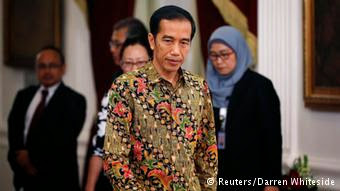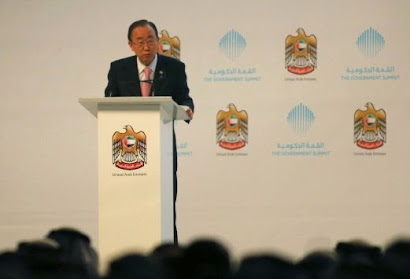Xie Feng
speaks at length about his thoughts on President Joko Widodo, the historic
treatment of ethnic Chinese, and the future of bilateral relations as both
countries pursue parallel visions
Jakarta Globe, Nov 13, 2014
On the eve
of President Joko Widodo’s departure for Beijing to attend this week’s APEC
Summit and meet a number of world leaders, including China’s President Xi
Jinping, the Chinese ambassador to Indonesia, Xie Feng, was interviewed by the
Chinese newspaper Global Times.
In the
interview, Ambassador Xie, who has been in the country since June, talked about
his impression of Indonesia, his interaction with the new president, economic
ties between China and Indonesia, and the correlation between Jokowi’s vision
of a “maritime axis” and President Xi’s plan to build a “21st-centurty maritime
silk road.”
With
permission, the Jakarta Globe is republishing the interview, which first appeared
on Nov. 6. It was edited for style only.
Global
Times: Global media said that Mr. Joko Widodo won voters’ support because he’s
a ‘People’s President.’ After your arrival in Jakarta, have you had any contact
with him and what are your impressions about him?
 |
| Chinese Ambassador Xie Feng. (Photo courtesy of the Embassy of the People’s Republic of China) |
Ambassador
Xie: In less than a decade, Mr. Joko Widodo’s journey from being a furniture
businessman to president is truly a political miracle in Indonesia and even
worldwide. In my first week as ambassador, I had the honor of meeting with him
briefly and was deeply impressed by his sincerity, easy-going style and
kindness. After that I had two in-depth conversations with him and paid
courtesy calls on him on several occasions with visiting Chinese delegations
after he won the presidency. I believe President Joko Widodo is a firm,
visionary, pro-people and down-to-earth leader, with a clear sense of purpose.
His policy agenda has a lot in common with that of Chinese leaders. These
include governance in the interest of people, pushing forward reform,
developing economy, improving public well-being and fighting corruption. The
Indonesian people have quite high expectations for him.
President
Joko Widodo told me that he much values the face-to-face communications with
the public. He believes such communications should happen day in and day out
and this is the only way to understand what people need. That’s why he
frequently visits traditional markets, rural villages and street food vendors
to talk to and eat together with people. In the Javanese language, there is a
specific word to describe his work style, blusukan. It means impromptu visit,
which is akin to what we call “reach out to the grassroots.”
Global
Times: What does President Joko Widodo’s trip to China mean to the APEC Summit
and China-Indonesia relations?
Ambassador
Xie: Indonesia was among the first countries to establish diplomatic relations
with China. In 1950s, China, Indonesia and other Asian and African countries
initiated the Bandung Spirit. At the heart of it is peaceful coexistence,
seeking common ground and shelving differences. The Bandung Spirit remains a
significant norm in state-to-state relations today. China today is Indonesia’s
largest trading partner, its No. 1 source of overseas tourists and a major
destination for Indonesian students. In October last year, President Xi Jinping
paid a successful state visit to Indonesia. He and Indonesian leaders agreed to
lift the China-Indonesia relationship to a comprehensive strategic partnership.
This has laid a solid foundation and mapped out a blueprint for the long-run
development of our bilateral relations. In 2014, Indonesia’s general elections
year, our bilateral relations have had a smooth transition and got off to a
good start. President Joko Widodo attaches great importance to China-Indonesia
relations. He has chosen China for his first overseas visit after inauguration.
Indonesia
was the birth place of APEC Bogor Goals. Last year, Indonesia hosted its second
APEC Summit in 20 years, and raised three major topics including achieving the
Bogor Goals, promoting sustainable and equitable growth and improving
connectivity. China actively echoed and supported these ambitions. We look
forward to closer coordination and cooperation with Indonesia for positive
outcomes out of this year’s APEC Summit, including launching the process of the
Asia Pacific Free Trade Area (FTAAP), promoting innovative development,
economic reform and growth, and improving connectivity in the Asia-Pacific
region.
Global
Times: It’s almost five months since your arrival in Jakarta. Can you share
with us some of your impressions about Indonesia?
Ambassador
Xie: I’ve been deeply impressed by Indonesia in many ways.
First,
Indonesia is a big country with rich resource endowment. Indonesia has around
250 million population. It is the world’s largest archipelagic state, with over
17,000 islands. It takes 9 hours to fly from its east to west. That’s roughly
the distance between London and Tehran. Indonesia has abundant natural
resources and is known as the Emerald of the Equator. My Indonesian friends
often say with great pride that ‘please don’t ask what we have, just ask what
we don’t have!’
Second,
diversity and inclusiveness. Indonesia is the most populous Muslim country in
the world, yet it’s also known for its ethnic and cultural diversity. We
Chinese value ‘harmony but not uniformity.’ In the same vein, the Indonesian
people believe in ‘unity in diversity.’
Meanwhile,
Indonesia has around 20 million Chinese Indonesians, that’s the largest ethnic
Chinese community outside China. Over the past hundreds of years, generations
of Chinese migrants sailed to Indonesia. They settled down and took root in
this country. They survived the tribulations yet always worked hard to pursue a
better life. Today, many of them have built a successful career and become
social elites. They have made major contribution to Indonesia’s economic,
social development and cultural prosperity, and have acted as a unique bridge
in promoting China-Indonesia friendly exchanges and cooperation. Since 1998,
successive Indonesian governments have made active efforts to improve the
social status of Chinese Indonesians and promote ethnic harmony. In 2000,
President Abdurrahman Wahid lifted the ban on Chinese culture and customs. In
2002, President Megawati Soekarnoputri announced the Chinese Spring Festival as
a public holiday in Indonesia. In 2006, the Indonesian House of Representatives
(DPR) passed a new law on citizenship, annulling the previous legal distinction
between native and non-native Indonesians. It marked an end to many
discriminatory policies against Chinese Indonesians. In March this year,
President Susilo Bambang Yudhoyono repealed the discriminatory term for the
Chinese Indonesians through legislation and adopted ‘Tiongkok’ and ‘Tionghoa’
to refer to China and Chinese Indonesians respectively. This past August,
Indonesia’s first Museum on Hakka history and culture was completed. President
Susilo Bambang Yudhoyono and I attended the opening ceremony. In his remarks,
President Susilo Bambang Yudhoyono spoke highly of the Chinese Indonesians’
outstanding contribution to Indonesia’s independence, development and progress.
Third,
goodwill and kindness. The Indonesian people are warm, hospitable and are
always ready to help others. Their happiness index is quite high.
Fourth,
great potential. Indonesia’s population, landmass and GDP are all over 40
percent of the 10 Association of Southeast Asian Nations member states
combined. It’s the only Southeast Asian member of the G20 and is the
16th-largest economy around the world.
Global
Times: China is Indonesia’s largest trading partner. Where is the growth point
for the bilateral commercial cooperation in the future?
Ambassador
Xie: China and Indonesia are both major emerging markets and developing
countries. Our economies are highly complimentary and the cooperation potential
is huge. Two-way investment will be a bright spot in our business cooperation
in the years ahead. And infrastructure is expected to be a new growth driver in
this regard. My Indonesian friends told me that the cargo freight from Papua to
Jakarta is three times the cost of shipping the cargo from Shanghai to Jakarta.
Nearly 50 million population in Indonesia have no access to electricity.
Infrastructure is a major bottleneck holding back Indonesia’s economic growth.
The Indonesian new government is implementing the ‘ocean highway’ strategy, and
planning to build 2,000 kilometers of road, 10 new airports, 10 new sea ports
and 10 industrial parks. The purpose is to promote air, land and sea
connectivity, and improve energy, telecommunications and transport
infrastructure. In my recent meetings with Indonesian leaders, responsible
officials of economic departments and entrepreneurs, I could feel their strong
desire to enhance cooperation with China.
Global
Times: President Joko Widodo vows to develop marine economy and turn Indonesia
into a global maritime axis. What’s the purpose of this strategy? What does it
mean to China-Indonesia relations?
Ambassador
Xie: Indonesia sits between the Pacific and Indian Oceans and connects Asia and
Oceania. It controls a number of strategic chokepoints, such as the Malacca Straits,
the Lombok Strait and the Sunda Strait. In history, Indonesia was a major hub
in the maritime silk road, with a rich legacy of friendly exchanges between our
two countries. The city of Semarang has been named after the well-known Chinese
navigator Admiral Zheng He. It retains much heritage of Zheng He’s voyages to
the Western Seas in the 15th century.
In his
inauguration speech, President Joko Widodo called for building Indonesia into a
maritime power. This policy agenda focuses on raising maritime awareness,
building ocean highways, promoting maritime connectivity, developing marine
economy, upholding maritime security and conducting maritime diplomacy. And the
Coordinating Ministry of Maritime Affairs has been established. In his visit to
Indonesia in October last year, President Xi Jinping announced the strategic
initiative of building a “21st century maritime silk road.” This is to develop
a ‘silk road’ spirit of peace, friendship, openness, inclusiveness and win-win
cooperation among China, Indonesia and other coastal countries of the maritime
silk road. The purpose is to promote policy communication, transport
connectivity, trade relations, monetary circulation and understanding between
the people, and build a community of common destinies. This shows the strategic
visions of Chinese and Indonesian leaders complement each other. Maritime
cooperation will become a ‘blue bond’ connecting our two countries’ development
strategies. It is expected to be a new highlight and a new driver for
strengthening the comprehensive strategic partnership and deepening the
practical cooperation between our two countries.
Related Articles:









No comments:
Post a Comment